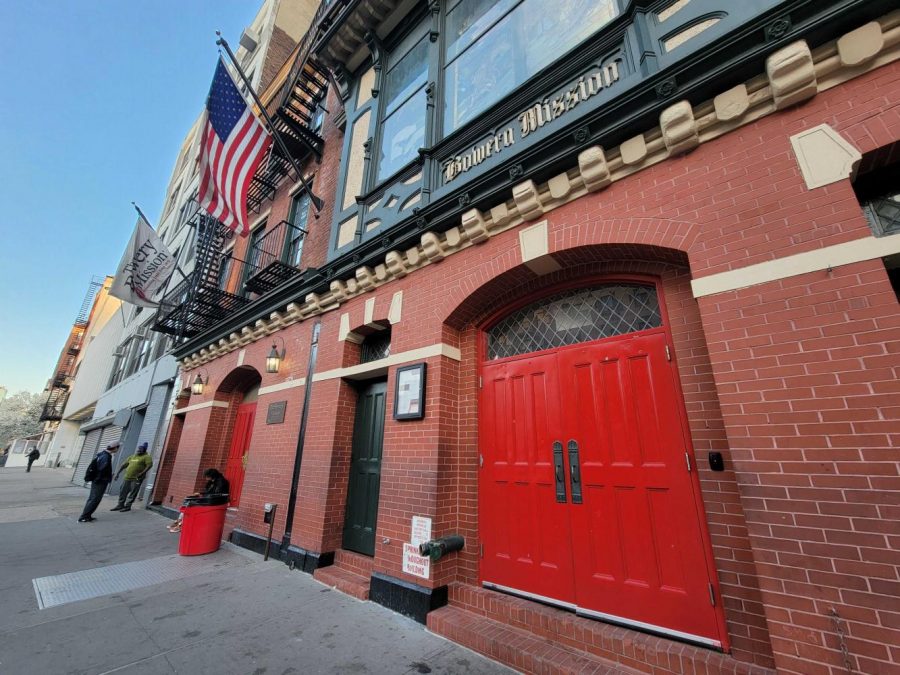Over 1.5 million New Yorkers are currently struggling to find meals, a 38% increase from pre-pandemic times. Food pantries play a vital role in feeding these vulnerable people.
The Bowery Mission is one of the city’s largest homeless shelters and food pantries. With eight locations across the metropolitan area, the organization has helped thousands of people during the pandemic.
“The Bowery Mission kept its doors open at the very beginning of the pandemic, when many other resources in the city were shut down, including roughly 40% of the city’s soup kitchens and food pantries,” The Bowery Mission’s Brian Ourien said.
Homeless shelters have also faced immense obstacles in serving vulnerable people. Despite the increase of homelessness during the pandemic, shelters have had to reduce the number of beds available.
“To ensure all onsite services are safe and sustainable, we have significantly adjusted operations to deliver on a number of new protocols for social distancing, cleaning, daily health screening and more,” Ourien said. “We have also undergone de-densification of overnight shelter beds at the recommendation of the New York City Health Department. The downside of this is that, for a short period of time, we were no longer able to serve as many guests.”
The Bowery Mission has since accommodated more guests by modifying sleeping arrangements and adding isolation areas.
Service organizations face other logistical difficulties in adhering to guidelines issued by federal and local authorities. Before the pandemic, meals were served in a large cafeteria where guests could socialize while enjoying their food. The Bowery Mission had to modify their dining service to avoid transmission of the virus.
“During March 2020, instead of closing down, The Bowery Mission modified its Bowery Campus meal service from three meals per day served family-style in the dining room to two meals served to go out the door,” Ourien said.
Many other organizations have also shifted to a grab-and-go model to comply with social distancing requirements. Holy Apostles, New York state’s largest soup kitchen, offers meal service every weekday from 10:30 a.m to 12:30 p.m. They also run a pantry program that provides food-insecure New Yorkers with locally sourced groceries.
“Increasing numbers of families with children, senior citizens, people experiencing homelessness and newly unemployed New Yorkers are turning to us for food assistance and other social support,” Holy Apostles Communications Associate Sarah Marcantonio said. “In 2019, [Holy Apostles] served about 80 households per week. With the arrival of COVID-19, the pantry program is seeing over 600 households per week, and the numbers continue to grow in 2021.”
Grab-and-go meal service prevents the risk of viral spread in cafeterias, but line spacing still needs to be maintained. Food pantries have added extra security guards and police barricades to facilitate safe service.
Donors, volunteers and business partners have been essential in supplying food pantries with necessary resources. Unfortunately, Holy Apostles had to suspend its volunteer program early in the pandemic. It has since brought back a limited program, allowing up to 50 people per week to volunteer.
“Our volunteers come in every day working on packing up bags for meal distribution, assembling pantry bags, managing guests’ mail and more,” Marcantonio said. “We also work with many New York-based chefs who have been volunteering their time and talent to cook at the soup kitchen.”
The Bowery Mission has likewise benefitted from partnerships with businesses and nonprofit organizations.
“We source emergency food donations through partnerships with nonprofit organizations, corporations and private businesses,” Ourien said. “Additionally, we received food donations from catering companies and connected to multiple food sources through our relationships with various government departments.”
Holy Apostles and The Bowery Mission are continuing to help as many vulnerable New Yorkers as possible while complying with COVID-19 guidelines. The organizations have slowly increased volunteer and service capacity, but a full reopening will likely be further down the line.
“Once leadership and operations staff deems it safe to do so, we will likely begin slowly phasing out of our grab-and-go system and reintroducing meals inside of the church,” said Marcantonio. “This likely won’t happen for some time, though. Hopefully, we will be able to reinstate some of our in-person social services programming as well.”
There are many ways to aid food pantries in their mission to feed people in need. Holy Apostles is currently seeking volunteers who are fluent in Spanish or Mandarin to translate information for guests who speak those languages. You can also volunteer in other ways: share social media posts, make financial contributions, and donate items such as food, clothing and personal protective equipment. For more information on how to help, visit The Bowery Mission and Holy Apostles to learn more.
Email Sabiq Shahidullah at [email protected].

























































































































































